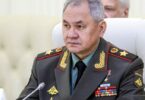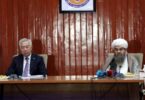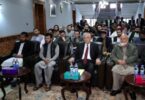KABUL (Pajhwok): Afghan women, making half of the country’s population, have equal stakes in the peace process, says the Ministry of Women’s Affairs. Women reserved the right to share their views on any proposal, decision or action by the parties involved in the peace drive, the ministry said.
It reminded the government, Taliban, the US and the international community of their duty to take into account the views of women in all their proposals, decisions and actions While stressing their active participation in national processes, the ministry collected views of women, including lawyers, politicians and civil society activists. The Afghan Women’s Network, academia, journalists, entrepreneurs and minorities also offered their views on the recent US peace proposal.
The ministry said in a statement: “Even though there are some positive points in it, there are also ambiguities in the proposal.” It added the vague suggestions would not help uphold the principles of good governance, security and rule of law.
Contrarily, the ministry noted, the proposal did not reflect realities of Afghan society and the efforts made by the people and government over the last 20 years in these areas. “Therefore, it (US proposal) may cause all (state) institutions the risk of collapsing,” the ministry warned. It went on to point to the idea of a 50-50 share in government evoked completely different and sometimes conflicting views.
If implemented, the plan would pave the ground for a civil strife in the country, according to the MoWA statement, which also outlined the strengths and weaknesses of the suggestions.
Strengths of principles for Afghanistan’s future: Recognition of the right to security for all ethnicities, tribes and religions. Supporting civil, political, economic, social and cultural rights of people, as well as backing Islamic values, social and political justice, national unity and sovereignty and territorial integrity of Afghanistan
Emphasis on guaranteeing the rights of women and children in political, social, economic, educational and cultural affairs in a future constitution. Emphasis on preserving and strengthening national institutions and other public institutions, including educational and security organs. Keeping in mind transitional justice and victims of the past 42 years of war.
Weaknesses and ambiguities: Ignoring the current constitution and emphasising on drafting a new constitution. While the current constitution is one of the best in the region, it only needs to be amended in some cases. There is also a mechanism for amendments in the constitution. So far, hundreds of laws and regulations have been formulated, endorsed and applied based on this constitution. By abandoning this constitution, the legal basis for performances of institutions and different sections of society will face serious challenges and unavoidable delays.
Transitional government and political roadmap
Strengths: Emphasising on separation of powers, including government, parliament and judiciary. Emphasising on fair appointments with meaningful participation of women and members of all ethnicities to government institutions.
Weaknesses and abiguities: In a country where administrative, governmental and security institutions have just been revived, the proposal of an interim administration means ignoring all institutional achievements. Moreover, the proposal for a transitional government seems reasonable in countries that lack infrastructure, national institutions and democratic organisations; not in Afghanistan where, despite shortcomings and limitations, the people and the government have worked so hard to maintain and strengthen the semi- democratic structure of democracy.
50-50 power-sharing between the Taliban (a terrorist group with little public support) and the government, politicians, political parties, influential groups of people, youth and women is unfair and irrational.
The second options with regard to the National Assembly (Parliament) and the Provincial Councils, which they want to suspend the activities of the mentioned institutions and at the same time raise the issue of their privileges, salaries and safety; considering the current situation of Afghanistan, it is unreasonable, rejected and is based on the spirit of ransom.
Lowering the status of the Independent Commission for Overseeing the Implementation of the Constitution (ICOIC) to an advisory role to the Supreme Court has brought the status of the Commission under questions. Recognizing Civil Dispute Resolution through non-governmental channels; without necessary support and legal basis, will only pave the way for strengthening desert courts, coercion and unjustly imposed decisions; especially for women.
The activity duration of the Supreme Council of Islamic Jurisprudence and how to elect and dismiss its members is unknown. Similarly, it does not mention anything about religious and gender composition.
Permanent and comprehensive ceasefire
Strengths: Commitment of the parties to end all military and offensive operations and hostile activities; Identifying prohibited violent provocation; Forming the Ceasefire Implementation and Monitoring Commission with the presence of 3 independent international observers.
Weaknesses and ambiguities: This proposal calls on the Taliban to commit to moving its military structures and offices from neighbouring countries to Afghanistan. The Taliban must also commit to dissolve their military structures so that in the next step, Taliban fighters, after their complete disarmament, are integrated into the the security system based on a specific and agreed mechanism.
Suggestions: The current constitution shall remain in force and the commission that will be created by representatives of both parties shall work on amendments to it; In order to prevent any governance failure, which will only affect the people of Afghanistan, the current government must continue to function until early elections are held by the United Nations.
The only difference should be that a certain percentage of government positions should given to the Taliban; The Taliban may introduce their representatives to the National Assembly and Senate until the next elections; The composition of the Supreme Council of Islamic Jurisprudence shall consist of all Islamic sects and gender representation shall also be ensured. The duration of the council, the manner of electing and dismissing its members, as well as their duties must be specific so that the independence of the three branches judiciary, legislature and executive is maintained and the activity of the Supreme Council of Islamic Jurisprudence does not disrupt the work of the three branches.
At the same time, the term of office of the council, the manner of electing and dismissing members, as well as their duties must be clear so that the independence of the three government branches — legislature, the executive and judiciary — are protected and the activity of the Supreme Council of Islamic Jurisprudence does not disrupt the work of the three pillars; Both sides (the Taliban and the government) must commit to the presence of at least 30% of women in all institutions, departments, commissions and committees. The Taliban must commit to introduce female representatives to attend and participate; Both sides (the Taliban and the government) must commit that after the new elected government takes office, perpetrators of war crimes will be brought to justice and the culture of impunity will end; Women representatives from both sides must be part of the Ceasefire Implementation and Monitoring Commission; The international community and the countries involved in the Afghan peace process; especially, the United States, must guarantee that the Taliban will abide by their commitments.






